Advanced Kidney Disease management
With Northlake Nephrology Institute
Understanding Advanced Kidney Disease
Advanced kidney disease occurs when declining kidney function starts to compromise day-to-day health, and without some form of renal replacement, long-term health is no longer sustainable. The term advanced kidney disease is used in lieu of the terms end-stage kidney/renal disease (ESKD/ESRD). Any distinction would be one of degree and severity, with the “end-stage” terms representing the more severe end of the advanced kidney disease spectrum.
There are two broad treatment approaches, one is some form of Renal Replacement, and the other is Conservative Management.
Renal Replacement Options for Managing Advanced Kidney Disease
There are three major forms of renal replacement – kidney transplantation, peritoneal dialysis, and hemodialysis. Of these, kidney transplantation offers the best survival and quality of life. Eligibility for kidney transplantation is more restrictive than other forms of renal replacement, and certain patients may not qualify due to their age and comorbidities.
Comparing peritoneal dialysis with hemodialysis, peritoneal dialysis generally offers a higher quality of life for most patients.

Kidney Transplantation
After finding a suitable donor, a surgery replaces your failing kidney with a healthy one, restoring 60%-80% of your renal function post-proceedure.

Peritoneal Dialysis
This home-based treatment involves flushing your abdominal cavity with a cleansing fluid that filters waste through the lining of your abdomen.

Hemodialysis
Conducted at our clinic, this process uses a machine to externally filter your blood and is typically required several times a week.
Conservative Management of Advanced Kidney Disease
Conservative management focuses on control of symptoms, quality of life, and preservation of remaining kidney function. Control of blood pressure, volume status, anemia, and bone health continue as with earlier stages of kidney disease, with continued use of appropriate medications and diet. Additionally, medications are used to treat other symptoms which may arise such as nausea and pruritus. This approach best serves patients whose quality of life would be extremely negatively impacted by their available Renal Replacement options.
Our Approach to Advanced Kidney Disease
The Northlake Nephrology Institute team will collaborate with you map out a treatment plan that takes into consideration your lifestyle preferences and values, as well as your comorbidities and overall health.
The decisions made in advanced kidney disease are clearly life-altering. Our NNI providers will be there to listen to you, to understand you, and to help you make the right decisions for you.
Dr. Simon made us feel absolutely wonderful. He made us feel safe. There was not a time that he didn't come into [my daughter’s] room and discuss different issues that she was having. He told us what type of treatment that he felt was right and what kind of medications were necessary. She was just very, very, very sick. When my daughter was originally diagnosed, the hospital didn't expect her to live very long. They thought she would survive two weeks and now it’s been two years.
- Rose R., Mother of a patient diagnosed with AL Amyloidosis

